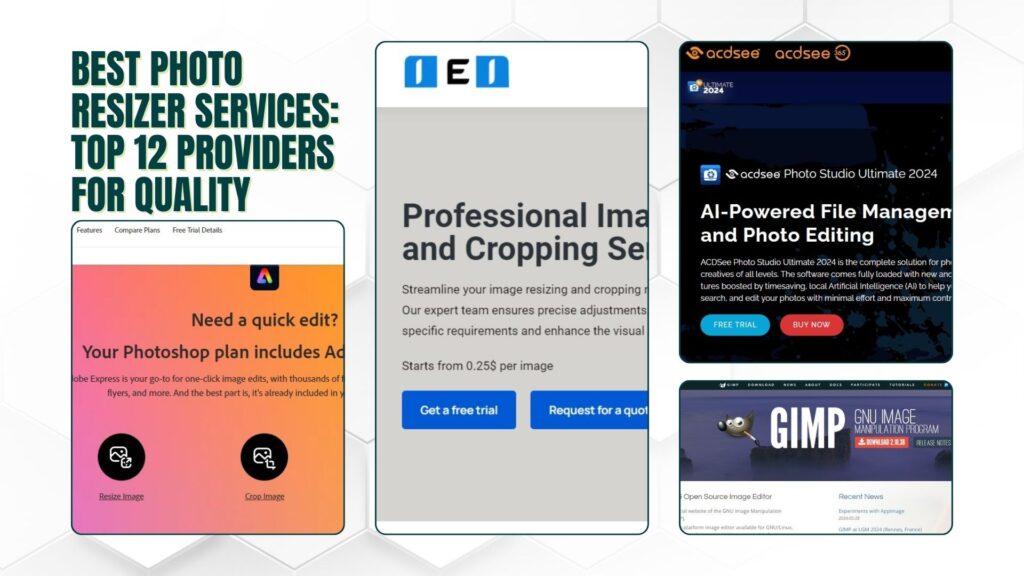In today’s digital age, high-quality images are crucial for both personal and professional use. While online tools are convenient, offline photo resizer software provides greater flexibility, security, and advanced features, especially when dealing with large files or when internet connectivity is an issue. Here’s a detailed look at the top 12 best offline photo resizer service providers that can help you achieve high-quality image resizing with ease.
1. imageexpertindia.com
imageexpartindia.com is a premium image editing service offering high-quality offline resizing options tailored to individual and business needs. As a comprehensive service provider, it specializes in custom resizing solutions for various applications, including print, web, and social media.
Key features include:
- Custom Resizing: Tailored resizing options based on specific requirements, ensuring that images meet the exact dimensions and quality needed.
- Professional Quality: Uses advanced tools and techniques to maintain image quality and sharpness during the resizing process.
- Bulk Resizing: Efficient handling of large batches of images, perfect for businesses and professionals with extensive image libraries.
- Additional Editing Services: Includes options for additional image editing tasks such as color correction, retouching, and format conversion.
Pros:
- Tailored resizing solutions for various needs
- High-quality results with professional standards
- Efficient bulk processing for large quantities of images
- Additional editing services available
Cons:
- Service-based, so it may not be as immediately accessible as software
- Pricing varies based on the scope of work and volume of images
2. Adobe Photoshop
Adobe Photoshop is the industry standard for image editing and resizing. It offers unparalleled control over image quality and dimensions, making it a top choice for professionals. With Photoshop, you can resize images by specifying exact pixel dimensions, percentage, or even physical size for print purposes. The software’s advanced algorithms ensure that the resized images maintain their sharpness and clarity, even when significantly reducing or enlarging the size.
Photoshop also supports batch processing, allowing users to resize multiple images at once. This feature, combined with its extensive editing capabilities, makes it an all-in-one solution for photographers, designers, and other creative professionals. Additionally, Photoshop’s integration with other Adobe products ensures a seamless workflow for those already in the Adobe ecosystem.
Pros:
- Industry-leading image resizing and editing capabilities
- Supports batch processing for multiple images
- Integration with other Adobe products for a streamlined workflow
- Extensive format support and customization options
Cons:
- Steep learning curve for beginners
- Requires a subscription, which can be expensive
3. GIMP (GNU Image Manipulation Program)
GIMP is a powerful, free, open-source image editor that offers a wide range of features, including high-quality image resizing. It provides tools for precise control over image dimensions, allowing users to resize by specifying pixels, percentage, or aspect ratio. GIMP’s resizing algorithm is designed to minimize quality loss, ensuring that your images retain their clarity even after resizing.
GIMP supports a variety of image formats and offers advanced editing tools, making it a versatile option for both professionals and hobbyists. The software also allows for batch processing through plugins, enabling users to resize multiple images in one go. GIMP’s open-source nature means that it’s continually updated and improved by a community of developers, ensuring that it remains a competitive alternative to paid software.
Pros:
- Free and open-source with robust features
- Supports precise resizing with minimal quality loss
- Batch processing available through plugins
- Regular updates and improvements from the community
Cons:
- User interface may be less intuitive compared to paid software
- Some advanced features require additional plugins
4. IrfanView
IrfanView is a lightweight and fast image viewer that doubles as an efficient photo resizer. Known for its speed and simplicity, IrfanView is ideal for users who need to quickly resize images without the need for extensive editing features. The software supports a wide range of image formats and allows users to resize images by specifying dimensions, adjusting DPI, or scaling by percentage.
One of IrfanView’s standout features is its batch conversion and resizing tool, which enables users to process multiple images simultaneously. This tool is particularly useful for users who frequently work with large volumes of images. Additionally, IrfanView includes basic editing tools, such as cropping and color adjustments, making it a versatile choice for quick image editing tasks.
Pros:
- Fast and lightweight software that’s easy to use
- Batch conversion and resizing capabilities
- Supports a wide range of image formats
- Free for non-commercial use
Cons:
- Limited advanced editing features compared to other software
- User interface may appear dated to some users
5. FastStone Photo Resizer
FastStone Photo Resizer is a dedicated image resizing tool that emphasizes ease of use and efficiency. The software allows users to resize images by specifying exact dimensions or by scaling based on percentage. FastStone’s batch processing feature is particularly powerful, enabling users to resize, rename, and convert large numbers of images with just a few clicks.
FastStone Photo Resizer supports various image formats, including JPEG, BMP, PNG, and TIFF. The software also offers additional features such as cropping, rotating, and adding watermarks, providing a well-rounded set of tools for managing and editing images. Its intuitive interface makes it accessible to users of all skill levels, while its speed ensures that even large batches of images are processed quickly.
Pros:
- Dedicated tool for efficient image resizing
- Powerful batch processing capabilities
- Supports multiple image formats
- Easy-to-use interface suitable for all users
Cons:
- Limited advanced editing features beyond resizing and basic adjustments
- Not available for macOS (Windows only)
6. XnConvert
XnConvert is a powerful batch image processor that excels at resizing images. The software supports over 500 image formats, making it one of the most versatile tools available. Users can resize images by specifying dimensions, scaling by percentage, or adjusting based on the longest or shortest side. XnConvert’s batch processing capabilities allow users to apply resizing and other transformations to large numbers of images simultaneously.
In addition to resizing, XnConvert offers a range of editing features, including cropping, rotating, adding filters, and adjusting color balance. The software’s interface is designed to be intuitive, with drag-and-drop functionality that simplifies the process of uploading and editing images. XnConvert is available for Windows, macOS, and Linux, making it a flexible option for users on different platforms.
Pros:
- Supports over 500 image formats
- Comprehensive batch processing capabilities
- Includes a wide range of editing tools beyond resizing
- Cross-platform availability (Windows, macOS, Linux)
Cons:
- Interface may be overwhelming for beginners due to the vast number of options
- Some features may require a learning curve
7. ACDSee Photo Studio
ACDSee Photo Studio is a comprehensive photo management and editing software that includes advanced image resizing tools. It allows users to resize images by specifying dimensions, adjusting resolution, or scaling by percentage. ACDSee’s high-quality resizing algorithm ensures that images retain their sharpness and detail, even after significant size adjustments.
One of ACDSee’s key features is its ability to handle large image libraries, making it ideal for photographers and designers who need to manage and edit thousands of images. The software supports batch processing, enabling users to resize multiple images at once. ACDSee also offers a range of advanced editing tools, including color correction, noise reduction, and lens correction, making it a powerful all-in-one solution for image management.
Pros:
- Advanced image resizing with high-quality output
- Excellent photo management tools for large libraries
- Supports batch processing for efficient workflow
- Comprehensive editing tools for professional use
Cons:
- Paid software with a relatively high cost
- May be overkill for users who only need basic resizing features
8. PhotoScape X
PhotoScape X is a versatile photo editor that offers a range of tools for image resizing and editing. The software allows users to resize images by specifying exact dimensions, scaling by percentage, or using preset sizes tailored for social media and web use. PhotoScape X’s resizing tool is designed to minimize quality loss, ensuring that images remain sharp and clear after resizing.
In addition to resizing, PhotoScape X offers a wide range of editing features, including filters, color adjustments, and text overlays. The software also includes a batch processing tool that allows users to resize and edit multiple images simultaneously. PhotoScape X’s user-friendly interface makes it accessible to both beginners and advanced users, while its wide range of features ensures that it can handle a variety of editing tasks.
Pros:
- User-friendly interface with a wide range of editing tools
- High-quality image resizing with minimal quality loss
- Batch processing capabilities for multiple images
- Available for both Windows and macOS
Cons:
- Free version has limited features; full version requires a purchase
- Some advanced features may require a learning curve
9. Movavi Photo Editor
Movavi Photo Editor is a user-friendly photo editing software that includes a robust image resizing tool. Users can resize images by specifying dimensions, adjusting DPI, or scaling by percentage. Movavi’s resizing tool is designed to maintain image quality, ensuring that resized images remain sharp and vibrant.
Movavi Photo Editor also offers a range of additional editing tools, including background removal, object removal, and color correction. These features make it a versatile option for users who need more than just resizing capabilities. The software’s interface is intuitive, with drag-and-drop functionality that simplifies the editing process. Movavi also supports batch processing, allowing users to resize and edit multiple images at once.
Pros:
- Intuitive interface with drag-and-drop functionality
- High-quality resizing with minimal quality loss
- Additional editing tools for background and object removal
- Batch processing capabilities
Cons:
- Paid software with a limited trial version
- Some advanced features may be less powerful compared to professional-grade software
10. Light Image Resizer
Light Image Resizer is a dedicated tool designed specifically for resizing images. It offers a simple and efficient way to resize images by specifying dimensions, adjusting resolution, or scaling by percentage. The software supports batch processing, allowing users to resize multiple images simultaneously, which is particularly useful for users who need to handle large volumes of images.
Light Image Resizer also includes additional features such as image compression, watermarking, and converting images to different formats. These features make it a versatile tool for users who need to prepare images for web use, email, or other purposes. The software’s interface is straightforward, with easy-to-understand options that make it accessible to users of all skill levels.
Pros:
- Dedicated tool for efficient image resizing
- Supports batch processing for large volumes of images
- Additional features like compression and watermarking
- Easy-to-use interface
Cons:
- Limited advanced editing features beyond resizing
- Paid software with a limited free version
11. ON1 Resize AI
ON1 Resize AI is a professional-grade image resizing software that uses artificial intelligence to enhance image quality during resizing. The software is designed to resize images to larger dimensions while preserving detail and sharpness, making it ideal for printing and other high-resolution applications. ON1 Resize AI’s advanced algorithms ensure that even when images are enlarged significantly, they retain their clarity and detail.
In addition to resizing, ON1 Resize AI offers a range of other features, including batch processing, preset sizes for various output formats, and integration with other ON1 products for a seamless workflow. The software also includes tools for cropping, rotating, and adjusting image quality, making it a comprehensive solution for photographers and designers who need to prepare images for print or web use.
Pros:
- AI-powered resizing for high-quality enlargements
- Advanced algorithms preserve detail and sharpness
- Batch processing capabilities
- Integration with other ON1 products
Cons:
- Premium software with a high cost
- Requires a powerful computer to run smoothly
12. PhotoZoom Pro
PhotoZoom Pro is a specialized image resizing software designed for enlarging images with minimal quality loss. The software uses proprietary S-Spline technology to resize images, ensuring that they retain their sharpness and clarity even when enlarged to large dimensions. PhotoZoom Pro is ideal for photographers, graphic designers, and other professionals who need to create high-resolution prints or prepare images for large displays.
In addition to resizing, PhotoZoom Pro offers advanced tools for adjusting sharpness, reducing noise, and correcting artifacts that may appear during the resizing process. The software’s interface is user-friendly, with options for batch processing and preset sizes that simplify the resizing process. PhotoZoom Pro is available as both a standalone application and as a plugin for popular image editing software like Photoshop.
Pros:
- Specialized tool for high-quality image enlargements
- Proprietary S-Spline technology for superior resizing
- Advanced tools for noise reduction and artifact correction
- Available as both a standalone application and plugin
Cons:
- Expensive compared to other resizing tools
- Limited to resizing and a few other specific functions
Conclusion
When it comes to high-quality image resizing, offline photo resizer service providers offer a range of tools to suit different needs. Whether you’re a professional photographer, a graphic designer, or someone who needs to resize images for personal use, there’s a solution out there for you.
Adobe Photoshop and GIMP offer powerful, professional-grade tools for those who need extensive editing capabilities, while IrfanView and FastStone Photo Resizer provide quick, efficient resizing solutions for users on the go. ON1 Resize AI and PhotoZoom Pro stand out for their ability to resize images to larger dimensions without losing quality, making them ideal for print and high-resolution applications.
No matter your needs, these offline tools ensure that you can resize your images with precision and quality, even without an internet connection.
FAQs
What is an offline photo resizer, and how does it differ from an online tool?
An offline photo resizer is a software application that you install on your computer to resize images without requiring an internet connection. Unlike online tools, which depend on a stable internet connection and often have limitations on file size or number, offline tools offer more robust features and greater control over the resizing process. They are especially useful for handling large batches of images or when working with sensitive data.
Are offline photo resizers better than online ones?
It depends on your needs. Offline photo resizers typically offer more advanced features, greater customization options, and the ability to handle larger files without the limitations of internet-based tools. They also provide better privacy and security since your images are not uploaded to an external server. However, online tools are more convenient for quick tasks and do not require software installation.
Can I resize images in bulk using offline photo resizers?
Yes, many offline photo resizers support batch processing, allowing you to resize multiple images simultaneously. This feature is particularly useful for businesses or professionals who need to process large volumes of images efficiently. Tools like FastStone Photo Resizer and XnConvert are known for their robust batch processing capabilities.
Is it necessary to purchase paid software for high-quality image resizing?
While there are many free offline photo resizers available that offer high-quality resizing capabilities (such as GIMP and IrfanView), some users may prefer paid software for additional features, better performance, and customer support. Software like Adobe Photoshop and ON1 Resize AI offers advanced tools and professional-grade results but requires a subscription or one-time purchase.
How do I choose the best offline photo resizer for my needs?
To choose the best offline photo resizer, consider the following factors:
- Features: Determine if you need additional editing tools, batch processing, or specialized resizing options.
- Ease of Use: Select software with an interface that matches your skill level and workflow.
- Compatibility: Ensure the software supports your preferred image formats and is compatible with your operating system.
- Budget: Decide whether you prefer a free tool or are willing to invest in paid software for advanced features.
- Performance: Consider the software’s ability to handle large files and perform tasks efficiently.














